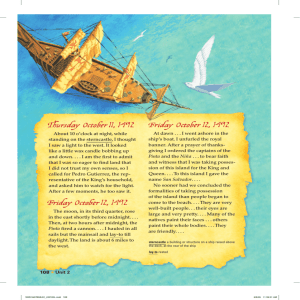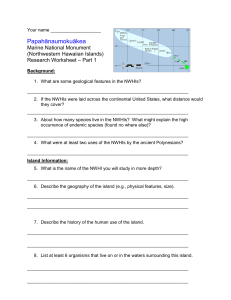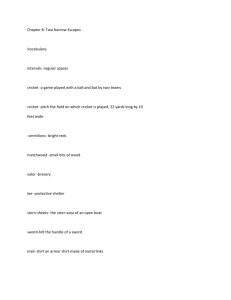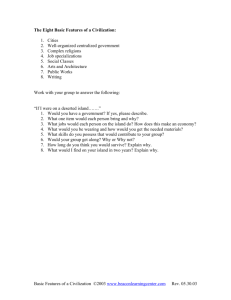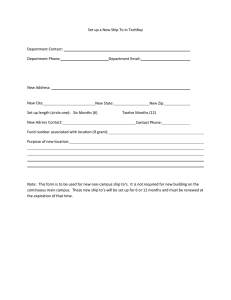1 Lewis Coolidge’s Journal
advertisement
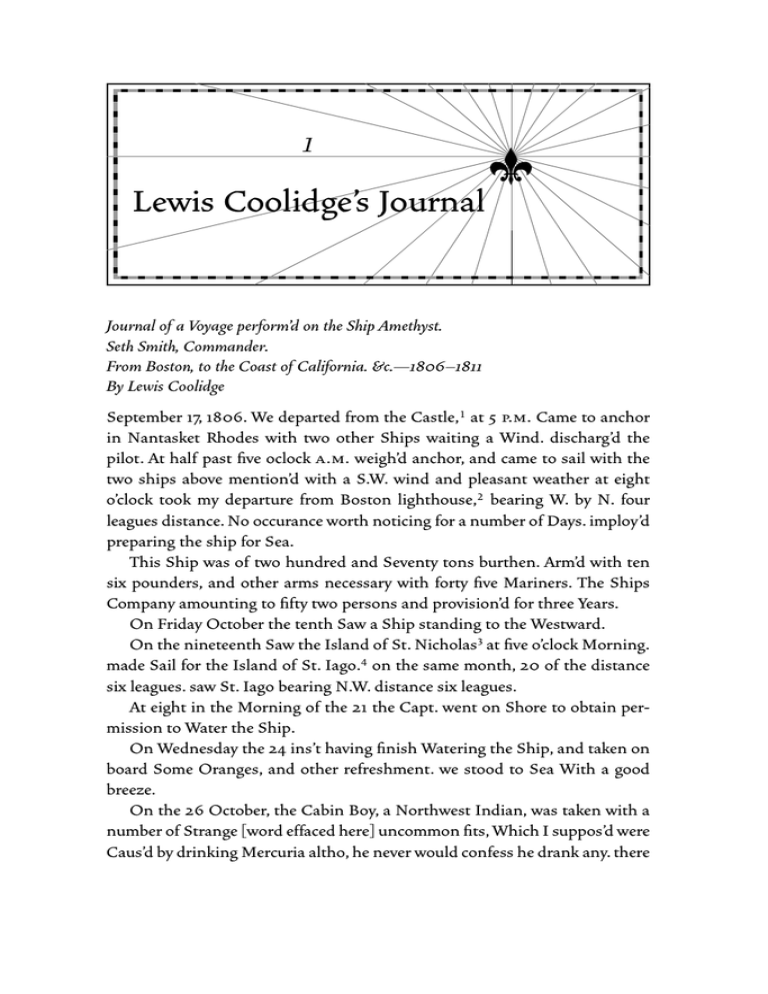
1 Lewis Coolidge’s Journal Journal of a Voyage perform’d on the Ship Amethyst. Seth Smith, Commander. From Boston, to the Coast of California. &c.—1806–1811 By Lewis Coolidge September 17, 1806. We departed from the Castle,1 at 5 p.m. Came to anchor in Nantasket Rhodes with two other Ships waiting a Wind. discharg’d the pilot. At half past five oclock a.m. weigh’d anchor, and came to sail with the two ships above mention’d with a S.W. wind and pleasant weather at eight o’clock took my departure from Boston lighthouse,2 bearing W. by N. four leagues distance. No occurance worth noticing for a number of Days. imploy’d preparing the ship for Sea. This Ship was of two hundred and Seventy tons burthen. Arm’d with ten six pounders, and other arms necessary with forty five Mariners. The Ships Company amounting to fifty two persons and provision’d for three Years. On Friday October the tenth Saw a Ship standing to the Westward. On the nineteenth Saw the Island of St. Nicholas3 at five o’clock Morning. made Sail for the Island of St. Iago.4 on the same month, 20 of the distance six leagues. saw St. Iago bearing N.W. distance six leagues. At eight in the Morning of the 21 the Capt. went on Shore to obtain permission to Water the Ship. On Wednesday the 24 ins’t having finish Watering the Ship, and taken on board Some Oranges, and other refreshment. we stood to Sea With a good breeze. On the 26 October, the Cabin Boy, a Northwest Indian, was taken with a number of Strange [word effaced here] uncommon fits, Which I suppos’d were Caus’d by drinking Mercuria altho, he never would confess he drank any. there 2 Coolidge and the Voyage of the Amethyst were Twenty [illegible] belonging to the Amethyst, that were afflicted With the Venereal in Various Stages, Some of them very bad. On the 29 [October] Saw a Sail standing after us, but according to our usual custom set Sail and ran away from her. On Tuesday the Sixth [day] of November we cross’d the Equator, and pass’d into South Latitude. [This] was a jovial Day for the Sons of Neptune. The greatest part of the Crew being (as the Sea Phrase is) Green Hands, were shav’d in the usual beastly Manner. The following detestable preparation was made, Viz. a lather of human excrement, Wine, tar, &c &c. A drunken Vagabond was fitted to represent the god of the ocean, and administer the Custemary Oaths. An Old Negro was imploy’d as Barber, with an Iron hoop for a raizor, and the above mention’d damnable Stuff perfum’d the victims of this villainous conduct. I was much’d suppris’d to See these inhuman measures Sanction’d by the Commander of the Ship and his two first o∞cers. I saught for a reason to justify theese things, Which to me appear so highly ridiculous, but could find none that could such a scene supportable to a person, who has been us’d to regular life. however in a place like this, all Vanity is lost, and there is no new scene to charm the Mind or delight the eye. One continual sameness awaits our lying down and rising up, except a Gale of Wind to Enrage the Ocean and set us tossing on its surfice, or Justice calls on the Commanders to inflict punishment on Some of the offending Crew. I have often heard the Character of Seamen very much extoll’d.—but experience teaches me the Sad reverse—I am led to believe, that their Humanity does not reach further than their Sunday, viz, Five leagues at Sea. and I think it may justly be accounted for in this way. They are the most ignorant Class of People in Existance, and must remain So, having no mean for information. As Soon as they are off the Ocean, they are plung’d in intoxication, and vice, in the most dirty places in City’s and Towns and among their own Class of beings. It is absolutly impossible that Brutal Ignorance should be a recepticle for refined Sentiments. I have sometimes seen a ray of Sensibility break thro the dark Clouds which Confin’d it, but it was like the glimmering of a fire bug, in the dusky Evening, to the Splendour of the noonday Sun— Saturday November 15. Saw the Island of Trinadada,5 bearing S. by W. six leagues distance. Latitude 31 South longitude 25.35 West from Greenwich. [____] Latitude 30 to Goughs Island, which lies in 40.15 South. we had [____] gales from the Westward. Lewis Coolidge’s Journal 3 Friendship of Salem replica. The original was a three-masted, square-rigged, 342-ton vessel built by Enos Briggs of Salem in 1796–1797. Full-size replica owned by the National Park Service of the U.S. Department of the Interior and berthed at the Salem National Historical Site, Salem, Massachusetts. The Amethyst also was a three-masted, square-rigged vessel built by Briggs. The Amethyst was built in 1800–1801 and was smaller than the Friendship, at 270 tons. Photograph by J. Felt Thursday November 27 at 4 a.m. discover’d Goughs Island,6 bearing E.S.E. distance 6 leagues [____] Seventy days from Boston. At 9 oclock the Captain Went on [shor]e to determine the State of the Seal on the Island, and the number [of ] men necessary to leave to prosicute the business of the Voyage. at Eleven [o]clock return’d, determin’d to leave Mr. Dorr with nine Men.—Imploy’d landing provision, and Watering the Ship, untill the fifth Day of December When we Saw, and lost sight of the Island, for the last time lying in 40.15 South latitude, and 9.21 West from Greenwich. — Goughs Islands has a most tremendous aspect from the Sea. The Mountains are prodigious high, and at this season were Cover’d With Snow, considerably below their Summits. the Whole Island is quite rocky, and barren, and the Water’s edge skirted with Precipices. On the mountains are large pieces of stone resembling cinder, and Lava, which I think is the same. which at some period isued from the boweles of the 4 Coolidge and the Voyage of the Amethyst Note on the construction of the Amethyst from Enos Briggs’s account book. Courtesy of the Peabody Essex Museum, Salem, Massachusetts Earth.—From our departure from this Island untill the twenty-fourth day of December we had pleasant weather, interpers’d with some wind and rain. On the twenty fourth, being in Latitude 45.11 S.and L. 43.24 West, there Came on a Tempest of Wind Snow, and Sleet. in its first onset we receiv’d a most furious shock which broke upon our larboard quarter, where it Stove in the quarterboards. the Sea making a clear breach over the ships deck. our rigging too suffer’d extremly, from the blow. amongst the rest, one of the Swiftures7 Parted, and We were (notwithstanding the violence of the Wether) oblig’d to rig preventer shrouds8 to Save the mast. At Midnight, We handed9 every Sail, and scud before the Wind under the bare Poles, untill the 26, when the storm abated, & we made Sail, under our Courses, only, the Ship rolling gunne[l] too, made it impossible to carry more, in this Tempest. the Ship drifted10 two and an half Knots (or miles) from N. W. to S.E.—On Saturday the twenty-Seventh cam on a heavy Gale accompanied with Snow and rain. At 6 o’clock a.m. hove too under the Storm staysail, making a drift of 2 miles pr hour N. by E. lat. 47.30 Long. 51.39 West. The Tempest Continued from the 27 to the 29. With a high labouring Sea, Shipping large quantities of Wate[r] on deck.— On Tuesday January 6, 1807, Capt. Smith finding o[f ] means for governing William Green inefectual, was determin’d to receive no more insults and abuse from Him, and after consulting his o∞cers, gave him a flogging with a small Rope prepar’d for that purpose. Lewis Coolidge’s Journal 5 The Cabin Boy Joe, receiv’d the Cat at the same time—according to the Sentance from the Inquisition—the Cat was known by Joe’s Coat of Arm’s— January 13. At 11 oclock a.m. Saw (The Seat of Boreas) Cape Horn bearing N.N.W. distance Seven leagues. Cover’d with Snow and Ice. at the Same time Saw a large Ship standing in shore of us. At 2 p.m. the Wind increas’d to a hard Gale wh[ich] at 4 oblig’d us to lie too under the Storm Staysail11 until 4 p.m. When the Ship Came bearing down upon us untill She was So near we cou’d discover her to be a man of war. We then made Sail the Ship “breasting the lofty Surge” and engulfing herself in the Deep which made it dangerous to be on deck. three of the most skillfull were lash’d to the Helm, and Cunn’d12 by the Captain. At night We lost sight of the Ship—The Whole distance Sail’d since leaving Boston, untill we Saw Cape Horn, being 12,900 miles pr. log. On the 17 January We were in the highest South latitudes, viz. 59.48 in this latitude, it being the longest days. Daylight was not gone, but Was Su∞ciently apparent to read on Deck, at any part of the twenty four hours. During our passage round the Cape, the Wind blew continually from the Westward, accompanied Wi[th] incessant squalls of Snow and Rain,which rendered the Weather very disagreeable. On the 20. January Saw Land, Which Was at the entrance of the Streights of Magallan, know by the name of Cape Villare or Villaris. On the prospect of Villare I cannot but remark, that the Goughs Island had an aspect extreemly barren and desolate, yet this Island, or Cape, far surpasses it in the Wildness and horror of its appearance. It seeming to be entirly compos’d of inaccessible rocks, without the least mixture of earth or mould between them.—Theese rocks terminate in a vast number of ragged points which aspire to prodigious heigh and all of them Cover’d with eternal snow, the points themselves are on every side surrounded with frightful precipices and often overhang in a most astonishing manner, and the hills which bear them are generally Sepparated from each other by narrow clifts, which appear as if the Country had been frequently rent by earthquakes. for theese Chasms are nearly perpendicular, and extend through the Substance of the main rocks, almost to their very bottom, so that nothing can be imagin’d more Savage and gloomy than the whole aspect of this Coast. There are large numbers of sea fowl in this latitude. We kill’d an Albatross, which measur’d from one extremity of the Wings to the Other, and found it to be ten feet 6 inches. By reason of head Winds, which blew heavey, we did not weather away Cape Villare, untill the 27 January When the Wind Shifted, and we once more were able to proceed on our Voyage. 6 Coolidge and the Voyage of the Amethyst And now after all our solicitude, and the numerous dangers We had Pass’d in Coming round Cape Horn, We had great Consolation in the flattering hopes we entertain’d, that our fatigues were drawing to a period, and that we Shou’d soon arrive in a more hospitable Climate, Where We Should be repaid for all our Sufferings. With theese ideas We left Magallan, and Villar, with “storms and Tempests Settled on its brow” to experiance the celebrated tranquillity of the Pacific Ocean. January 31. All hands imploy’d in Mounting Guns and making Catriges to be in readiness to enter a harbour on the Coast of Patagonia13 to Wood and Water the Ship. Tuesday February 3. At 12 O’ Clock, Noon, saw land bearing E.N.E. distance seven leagues, and Stood in for the Same. At 5 p.m. Came to an Anchor in nine fathoms Water in a safe and Comodious harbour on the Coast of Patagonia Latitude 41.12. Longitude 74 We[st] being at the Southerly Part of the Eastern Side of the Island. This Harbour abounds with Geese, Shags and a variety of other Sea birds. her[e] I went on Shore for the Second time Since leaving Boston, being out one Hundred and forty days. All hands were employed in Wooding and Watering the Ship until the 10 February When having Completed our buisiness in this place at 4 O’Clock a.m. Weigh’d anchor to beat out of the Bay. but the Wind blowing a Gale, and it being thick and dark Weather, finding We cou’d not weather away the land, at Noon Wore Ship, and at 4 p.m. after Being out twelve hou[rs] regained the Harbour, and anchor’d on the Old Ground. We had scarcly furl’d the Sails before We Were oblig’d to let go both Anchors, the Wind being very violent— When going out of the Harbour, Mr. David Christie, who had lately been appointed fourth Mate of the Ship, was instantly Swept by a Swell of the Sea from the Sheet Anchor,14 and went under the bows of the Ship—notwithstanding all possible serch being made—He Was Seen no more.—Peter Gellier, a Frenchman, and John Hollingsworth, at the eminent risk of their lives, Went in the Boat, to attempt his rescue.—;During the remainder of our stay here, all hands were imploy’d in their Several ocupations. The mountains in the interior Country are Cover’d With snow considerably below their summits which I presume lies on continualy, this being the mid summer in South latitudes. Theese Mountains stretch from Mexico to the Streights of Magallan, and are Known by the name of the Cordillare[s.] the Islands, and Coasts of this part of Pategonia, are cover’d wi[th] Wood, and planted by the hand of Nature So thick, it is di∞cult to penetrate far into it.— The Water is very good in this Harbour, and is a place very well fitted to Wood and Water Ships, that visit theese seas. Here are greens resembling Lewis Coolidge’s Journal 7 potatoe tops, which the Captain made use of, and some small berrys, like Goosberrys. A Tree also grows here, the bark of which is as hot as Pepper. One of the men kill’d an animal in the Woods similar to a rackoon.— February 15. the Wind Shifted to the South east. We joyfully embra[ced] the opportunity. Weigh’d anchor and proceeded to sea, with a fair wind being very much tired of a place where it hail’d, or rain’d, every day. The Whole Distance sail’d by log since leaving Boston being 15,366 Miles.—On Sunday February 22. Saw the Island of Juan Fernandez, bearing N by E. distance about ten leagues. at eight o’clock p.m. the Island bore the same, distance. three leagues, at 9 o’clock p.m. We were up with the small Island lying, and making the South West Point, call’d Goat Island. We pass’d Juan Fernandez between the hours of ten and eleven oclock in the evening within two miles of the Lee Shore. The Wind blowing high from the Westward accompanied with freequent squalls of rain, rendered passing on this side dangerous. This was the most interesting Night I ever witness’d. we were at one time so near the Shore, as to hear distinctly the noise of the Sea, breaking on the beach. and the horizon being overcast with flying, tempestuous Clouds. Cynthia,15 my favourite Planet, seem to rush at intervals from behind their envious obscurity to observe our situation, and direct us the way “by the brightness of her Countenance.” Juan Fernandez is remarkable for being the residence of Alexander Selkirk, a Scotch-man, Whose life and adventours furnish’d D’Foe with the ground work, of that admirable Romance, Robinson Crusoe.—Tuesday, February 24. We took the South E. trade winds in latitude 30.30 our course being North 33.45 West. Long. 83.19, having Sail’d since We left Boston, 16,617 miles pr. log. variation 9.37. Eastily. March 3. Longitude by Luna observation 87.7. 45 West from Greenwich. Latitude 14.39. South. March 10. Caught three hundred Gallons Water and one Shark. Saturday March 14th. pass’d from South into North Latitude, being from Gough’s Island 100 days, and from Boston 178. Longitude 99.56. having Sail’d 18,745 miles. From three degrees of South Latitude, untill We cross’d the line, we had very heavy rain. March 17. Latitude 3.49 North. we had hard rain, lightning and thunder. March 19. light Winds, and calm. In crossing the line We had variable winds from three degrees of South latitude. This day we caught seven Turtles. it would naturally be suppos’d that this would be a great luxury to us. but the damn’d Scullion: they were intended to be made into soups, but prov’d nothing but a Vile unpalatable pernicious sophistication, balderdash’d 8 Coolidge and the Voyage of the Amethyst with a little Flour. which made a delatorious paste, in truth, it was so void of all taste, nourishment and flavour, that a man might dine as comfortably (even with out O.P.) upon a White frigasee of Kid skin gloves, or Chip hats from Leghorn.—latitude 5.23 North. Longitude 103. West. March 22. Caught a Shark.—“Come hither all Ye Epicurian Blades”—16 April 1. we took the NE trade Winds, in seven degrees North Latitude, but found them much more variable than the South East trades. The NE trades [which] we were crossing varied from East to North, but were generally from N.E. to North. April 14. Latitude by observation 26.54 North. Longitude, by taking the distance of the Sun and Moon together with their respective altitudes, 126.24. April 19. Saw the Island of Guardaloup, bearing E. by N. distance 12 leagues. On the 20: civil time, at 7 o’clock a.m. the Captain Went on Shore. the Ship stretching off, and on the land.—at 7 o’clock. Return’d, giving a favourable account of the Seal.— From April 20 to the 30, we were imploy’d in sirching the Island for water, on the 29 day I set out to travel on the mountains, and thro deep glens an[d] vallies in sirch of water, but could find none, that I thought might safely be depended upon for the use of the men design’d to be left here. After being gone three days, and Nights, having travel’d over most part of the Island, I return’d to the Southerly part of it, where Mr Carr, and the remainder of the people, we[re] taking Seal. The North part of the Island is cover’d with Ceder, and various kind of bushes. the Land rises gradually from the Sea, to the midd[le] of the Island, which is very high. the course of its ascent is often interupted b[y] vallies, and hills of a peculiar Kind of red, and blue Earth. These Vallies wi[nd] irregularly thro the Island, and the gradual swellings of the Hills, with their different combinations of Colour, are most charmingly contrasted with the Woody summits of the Northern Mountains, rising in majestic Grandeur—The Cloud top’t peaks in the Center, which appear like a fantastic Vision—and the dark and rocky promentories below. There is the appearance in many places subtoranious fires, which probably issued from the high mountains of the Island. Latitude 29.5 North. Longitude 117.55. West. April 30 Peter Tinkham accidently a large bason, entirly of rock, containing upwards of one hundred H[d]17 of Water. I never had an opportunity of visiting this remarkable Well, I cann[ot] discribe it particularly. no Kind of spring, as could be perceived, led into it. t[he] water is not clear, of a white colour, as Lewis Coolidge’s Journal 9 if Chalk had been mix’t with it, but. was different in taste, than any other. this fortunate discovery has saved immense troub[le] as the Ship wou’d inevitably have been obliged to go up the Coast of New Albion18 for water, for the use of the men to be left here. One great inconveniance atte[nds] this. the Water here is nearly four miles from the beach, Where the huts are erected. [Con]sequently the men will be obliged to bring it down over rocks, and thro defiles, [hard]ly passable, expos’d to “all Weathers,” in Kegs of seven Gallons, made for the purpose. I am apprehensive this will create a difficulty among them, but to return. After landing Mr. Carr, the first o∞cer, and nine men, with provisions for the present, We proceeded on the first of May in sirch of other Is[land]s we being becalm’d under the high lands of Guadeloupe, we did not loose sight of land, untill May 3. May 4. at four o’clock p.m. Saw land bearing from N.N.W. to E.N.E. distance seventeen leagues, and stood in for the same. The Captain went to examine the Shore, but finding no fur seal, as he expected, ret[urn’d] to the Ship and beat to the northward. Latitude by Observation 27.37. North.—May 5. in the morning, saw two Islands, to the northward. plying to windwa[rd] for the same, we ran between the small Island of Natividad and the west poi[nt] of Saint Banca19 on the Main Continent of America, and found in some places only seven fathoms water, rocky bottom, with large quantities of kelp and coral weed. sent the boat on Natividad, and found large number of hair Seal, but cou’d see no Fur seal, as we expected. This Island lie[s] in Latitude 27.47. north longitude 115. West. May 6, 1807. At 6 o’clock p.m. the Captain went on Shore on the Island of Cerros20 distance about ten mi[les] from Natividad. returned and Anchored in seventeen fathoms, sandy bottom the south east part the Island. May 7. weigh’d Anchor and sa[il’d] up the Eastside of the Island, to water, and came to anchor in 28.3. nort[h] latitude eastily of the High Peak.— Near the watering place, we found a number of Huts, containing some Cloathing, otter, fur seal and other Skins, which we concluded, by the Appearance in which they were left, had been abandon’d by Indians, who had been living on this Island, as we found Bows, arrows, and other implements of war, with some cloaks, and shoes, trim’d in the Indian manner. The Huts were made of skins, in a Conical form, and very small—we suppos’d that the Spaniards, who inhabit the neighbouring Coast of California, had taken the Indians from their habitations on Cerros. preposess’d with this idea, We took some Skins and other Articles, that we thought might be most useful to us.— 10 Coolidge and the Voyage of the Amethyst May 11. A Mr. Woodward came on board in an Indian Canoe. with two Indians. He inform’d that He had been left on this Island by Cap. Windship of the Ship, O’Cain of Boston, with a number of Indians, for the purpose of collecting otter skins. That they then liv’d about ten miles to the Northward, in a place more secure from the Spaniards that inhabit the Coast and of Whom they felt some degree of fear. That the O’Cain had Sail’d to the Northward, where Captain Windship had about seventy Canoes, collecting Otter Skins, on the Coast of New Albion. Captain Smith after hearing this statement, order’d every thing taken from the Huts, to be return’d, which was accordingly done, and dismis’d Woodward, with some presents very much to his Satisfaction.—Having finish’d. Watering the Ship, weigh’d Anchor, and proceeded to the St. Benitos, presents three small Islands, lying Twenty five miles, West of Cerros. Saturday May 16. Came to an anchor, in nineteen fathoms water, rocky bottom, in the range of the White Rock, bearing W. by N. distance one half Mile. The extremity of the Isle’s bearing NE./4 North, we were agreeably suppris’d to observe vast numbers of Fur Seal, upon the beach.—After landing provisions, and Water, the Ship on the 19, return’d to Guardaloupe leaving Thompson Patching, second o∞cer, as President, and thirteen men, who began to build their Huts, and make preparation, to prosicute the business of the Voyage. Friday June 4, at civil time, at 6 o’clock p.m. the Ship came back from Guadaloup having left Mr. Carr, fourteen men. June 14.The Ship went to the Easterly part of Cerros to water,leaving a number of men on the Benitos. the long boat, which had been deck’d, lengthen’d, and rigg’d as a Shallop with two masts, Sail’d the same time. this Shallop is intended to transport Water from Cerros to theese Isles. she is made capable of carying fourteen barrells at a time. Captain Windship having return’d from the main, Captain Smith made a Contract with him, for five Sandwich Island Indians, to assist us in collecting Seal Skins. June 22. The Ship having water’d, sail’d on her Voyage, back to Goughs Island, to take off Mr. Dorr & Company. I remain’d on the Three Sisters, (nam’d from its three Mountains) one of the Benitos, as Governor, with five men. Stephen Howe with five men, proceeded by order of Capt. Smith, to the Island of Cerros to collect Skins there. Whole distance, the Ship sail’d While I was on her was 22,582 miles, When I left her at the Saint Benitos.

